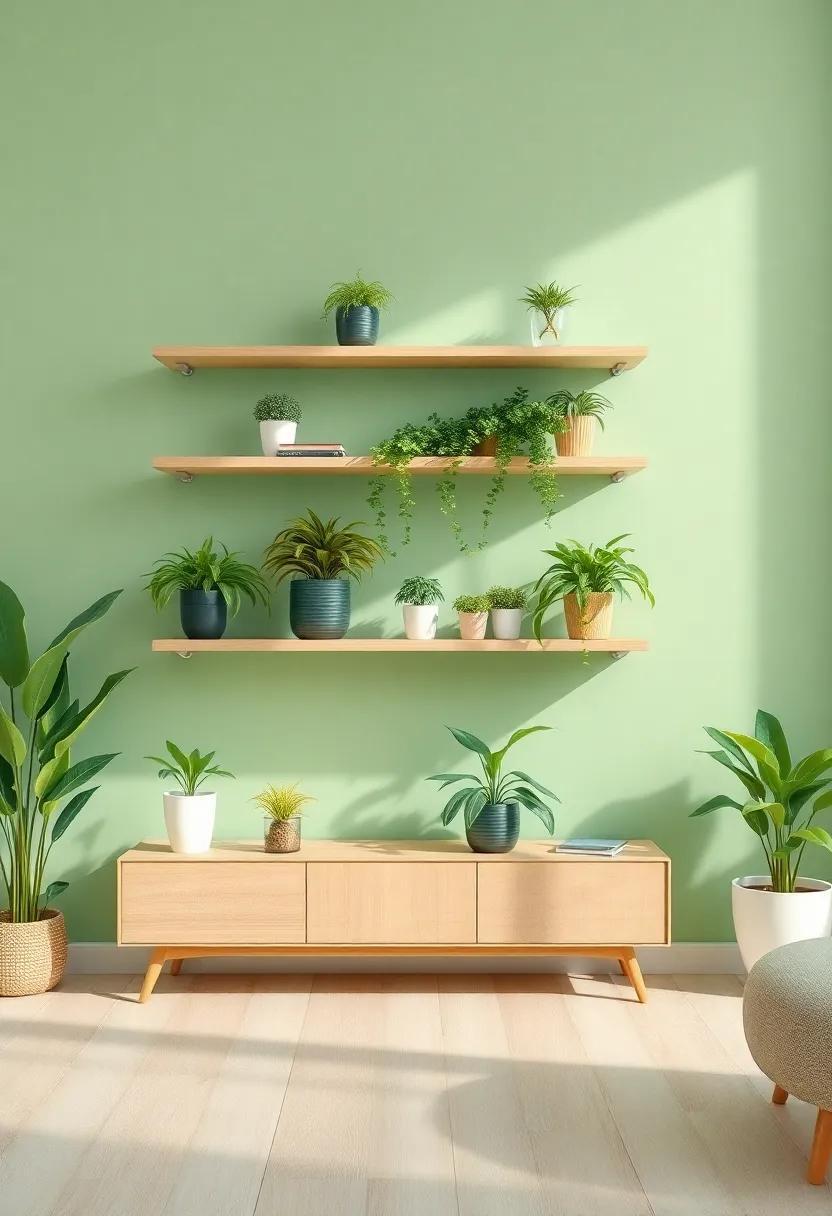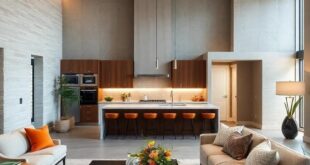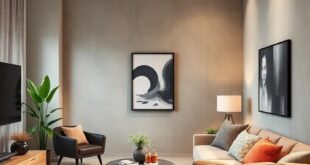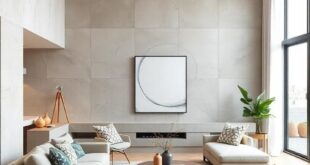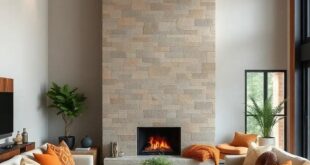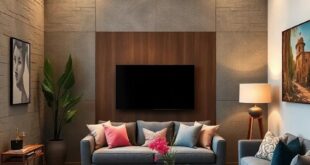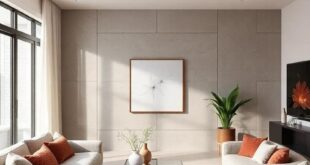Step into a world where nature meets design, and greenery becomes the centerpiece of your living space. In today’s homes,plants are no longer just accessories—they’re statement pieces that breathe life,color,and tranquility into every corner. But how do you showcase your leafy companions in a way that’s both stylish and functional? Enter the art of shelving. From minimalist floating shelves to bold, sculptural units, the right shelving can transform your living room into a lush, plant-filled sanctuary without sacrificing elegance. In this article, we explore innovative shelving ideas that marry form and function, helping you create a space that’s as chic as it is green. Whether you’re a seasoned plant parent or just starting your indoor jungle, these ideas will inspire you to elevate your decor with a touch of verdant sophistication.
The Art of Blending Greenery with Modern Shelving Designs
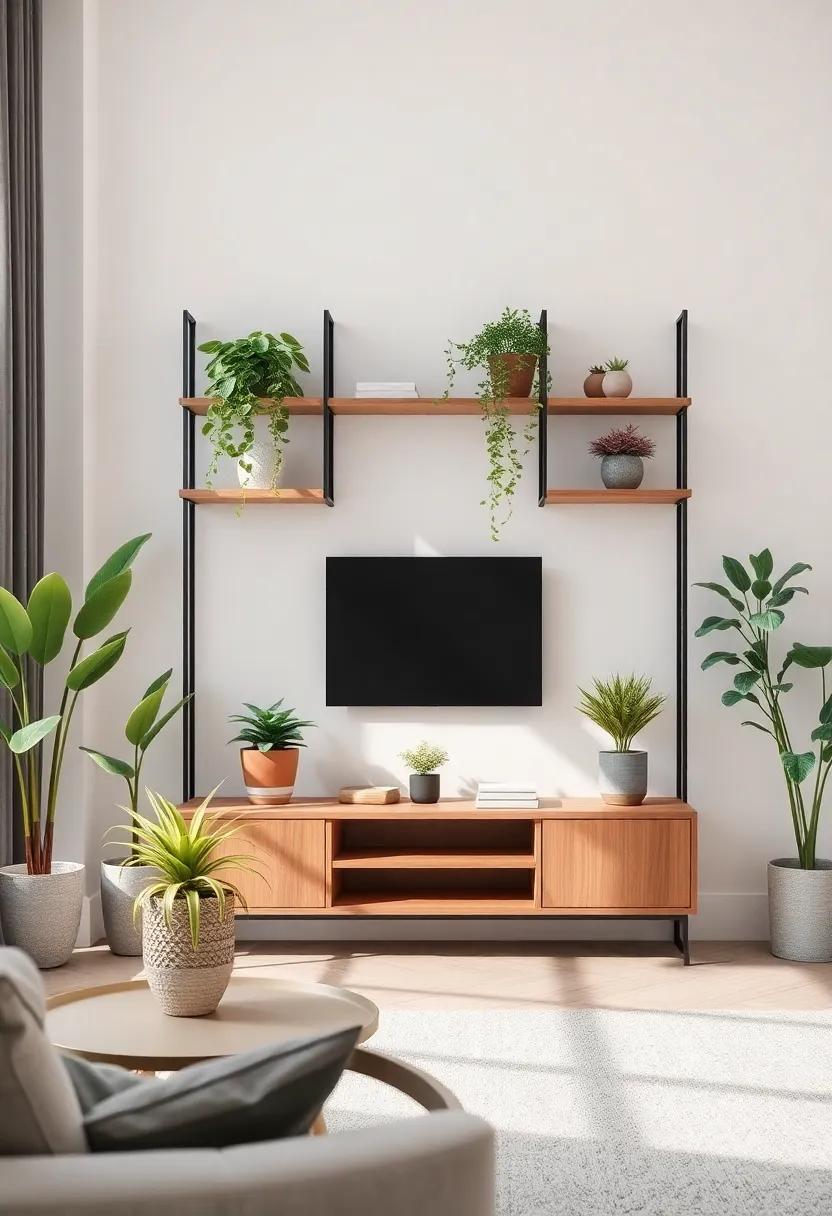
Incorporating greenery into modern shelving designs is more than just a trend—it’s a way to breathe life into your living space. By blending lush plants with sleek shelving units, you create a harmonious balance between nature and contemporary design.Floating shelves are a perfect choice for this, as they provide a minimalist backdrop that allows your plants to take center stage. Pair them with trailing vines like pothos or philodendrons for a cascading effect that adds depth and texture to your walls. For a more structured look, consider geometric shelving units that can house both plants and decorative items, creating a curated yet organic display.
when designing your plant-filled shelving, think about the interplay of colors, shapes, and materials. Wooden shelves with warm tones complement the natural hues of greenery, while metal or glass shelves add a modern, industrial edge. To elevate the aesthetic,arrange your plants in a mix of sizes and heights,using pots that match your room’s color palette. Here’s a quick guide to help you style your shelves:
- Layering: Place larger plants at the bottom and smaller ones above for a balanced look.
- Grouping: Cluster plants of varying textures together to create visual interest.
- Accents: Add decorative elements like ceramic vases or books to break up the greenery.
| Plant Type | Recommended Shelf Style |
|---|---|
| Trailing Plants | Floating or Ladder Shelves |
| Succulents | Geometric or Tiered Shelves |
| Tall Plants | Floor-to-Ceiling Units |
Curated Plant Displays That Transform Your Living Space
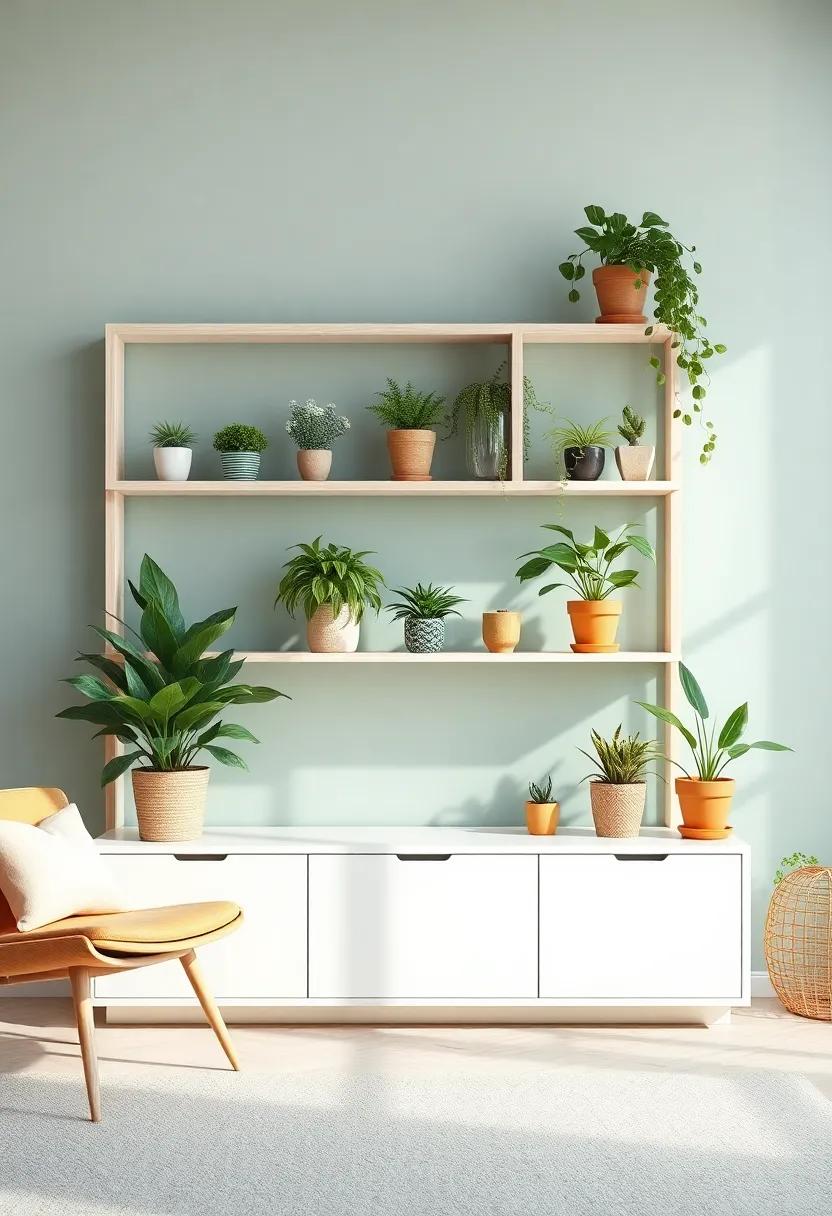
Transform your living room into a lush sanctuary with curated plant displays that blend functionality and style. Shelving units are the perfect canvas for showcasing your greenery, offering both vertical space and a chance to create visual interest. Floating shelves in natural wood tones can add warmth, while sleek metal designs bring a modern edge. Arrange plants of varying heights and textures to create depth—think cascading pothos, bold fiddle-leaf figs, and delicate ferns. Don’t forget to incorporate decorative elements like ceramic pots, woven baskets, or small sculptures to elevate the overall aesthetic.
For a cohesive look, consider grouping plants by theme or color palette. A monochromatic arrangement with shades of green can evoke tranquility, while pops of vibrant blooms add energy. Below is a simple guide to pairing plants with shelving styles:
| Shelving Style | Recommended Plants |
|---|---|
| Minimalist Metal | Snake Plant, ZZ Plant, Succulents |
| Rustic Wood | Monstera, Boston Fern, Spider Plant |
| Industrial Pipe | Rubber Plant, string of Pearls, Air Plants |
Experiment with asymmetrical layouts or symmetrical arrangements to suit your personal style. Whether you’re a seasoned plant parent or just starting your green journey, these shelving ideas will help you craft a living space that feels alive and inviting.
Choosing the Perfect Shelving Material for a Natural Aesthetic
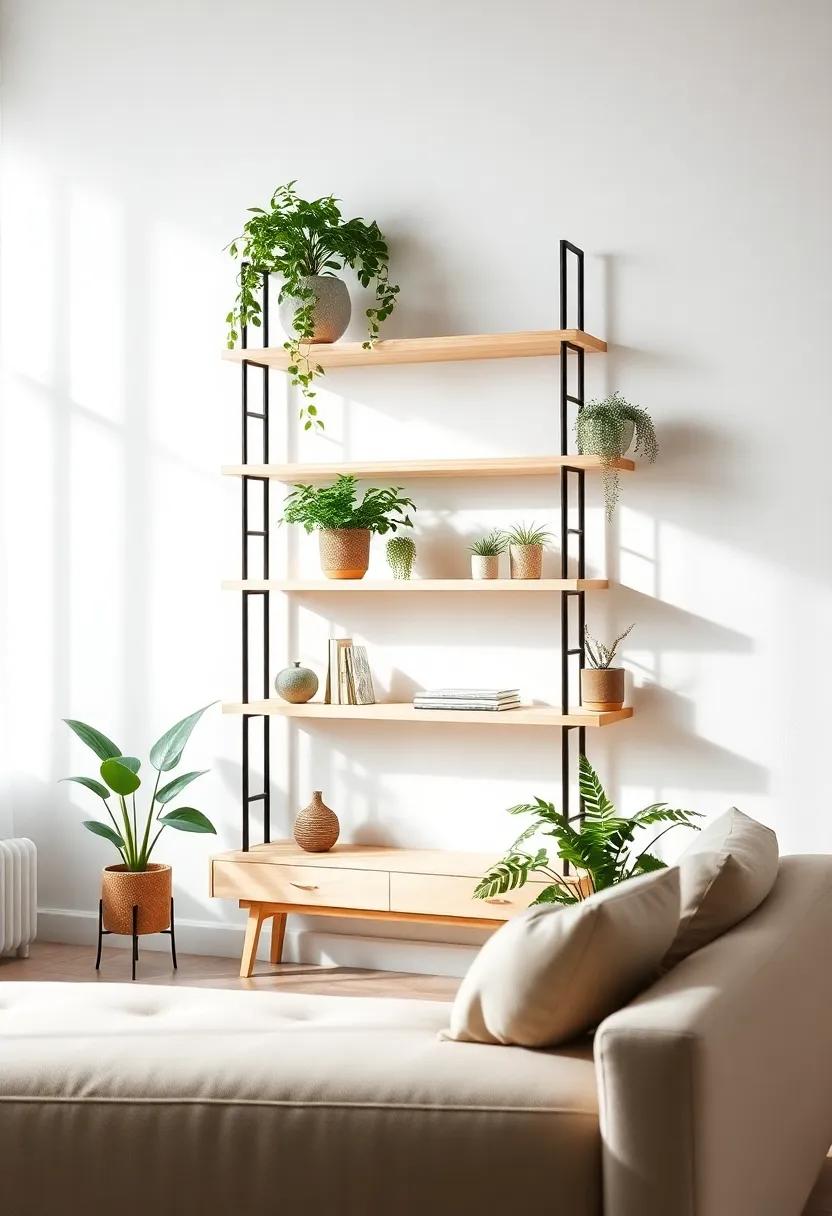
When designing a plant-filled living room, the material of your shelving plays a pivotal role in achieving a natural aesthetic. Opt for materials that complement the organic vibe of your greenery while adding a touch of elegance. Wood is a timeless choice, offering warmth and texture that blends seamlessly with plants. reclaimed wood, in particular, adds character and sustainability to your space. For a modern twist, consider bamboo, a lightweight yet durable option that exudes eco-friendliness. Alternatively, stone or concrete shelves can introduce a raw, earthy feel, perfect for balancing lush foliage with a minimalist edge.
To help you decide, here’s a quick comparison of popular shelving materials for a natural aesthetic:
| Material | Key Features | Best For |
|---|---|---|
| Reclaimed Wood | Eco-friendly, rustic charm | Bohemian or farmhouse styles |
| Bamboo | Lightweight, enduring | Modern or tropical themes |
| Stone/Concrete | Durable, earthy texture | Minimalist or industrial looks |
Pair your chosen material with thoughtful styling to enhance the natural vibe. Use floating shelves to create an airy, open feel, or opt for ladder-style shelves to add vertical interest. Incorporate woven baskets or ceramic planters to further elevate the organic aesthetic. Remember, the right shelving material not only supports your plants but also becomes a statement piece in your green sanctuary.
Vertical Gardens as Living Room focal Points
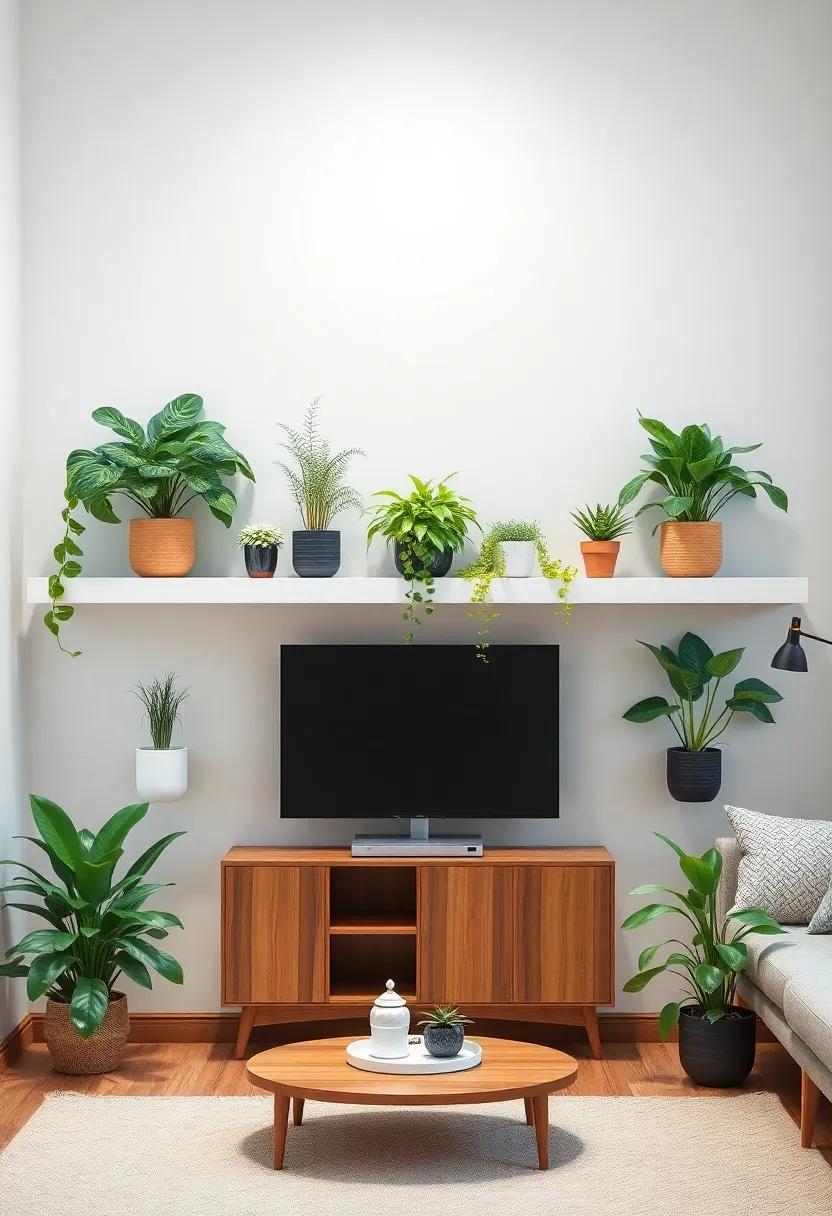
Transform your living space into a lush sanctuary by incorporating vertical gardens as stunning focal points. These living walls not only purify the air but also add a touch of nature-inspired sophistication to your decor. Consider using floating shelves or modular planters to create a dynamic display that complements your interior style. Whether you prefer a minimalist arrangement or a dense, jungle-like aesthetic, vertical gardens offer endless possibilities for customization.
- Mix and match plant varieties for texture and color contrast.
- Use LED grow lights to highlight your greenery and ensure healthy growth.
- Incorporate decorative pots or geometric planters for a modern touch.
For those who love institution, a well-structured vertical garden can also serve as a functional piece of art. Below is a simple guide to help you choose the right plants for your living room:
| Plant Type | Light Requirement | Maintenance Level |
|---|---|---|
| Pothos | Low to Medium | Easy |
| Ferns | Medium | Moderate |
| Succulents | High | Low |
By combining functionality with aesthetics, vertical gardens can elevate your living room into a serene, stylish retreat. Experiment with different layouts and plant combinations to create a space that feels uniquely yours.
Incorporating Minimalist Shelving for a Clean, Green Look
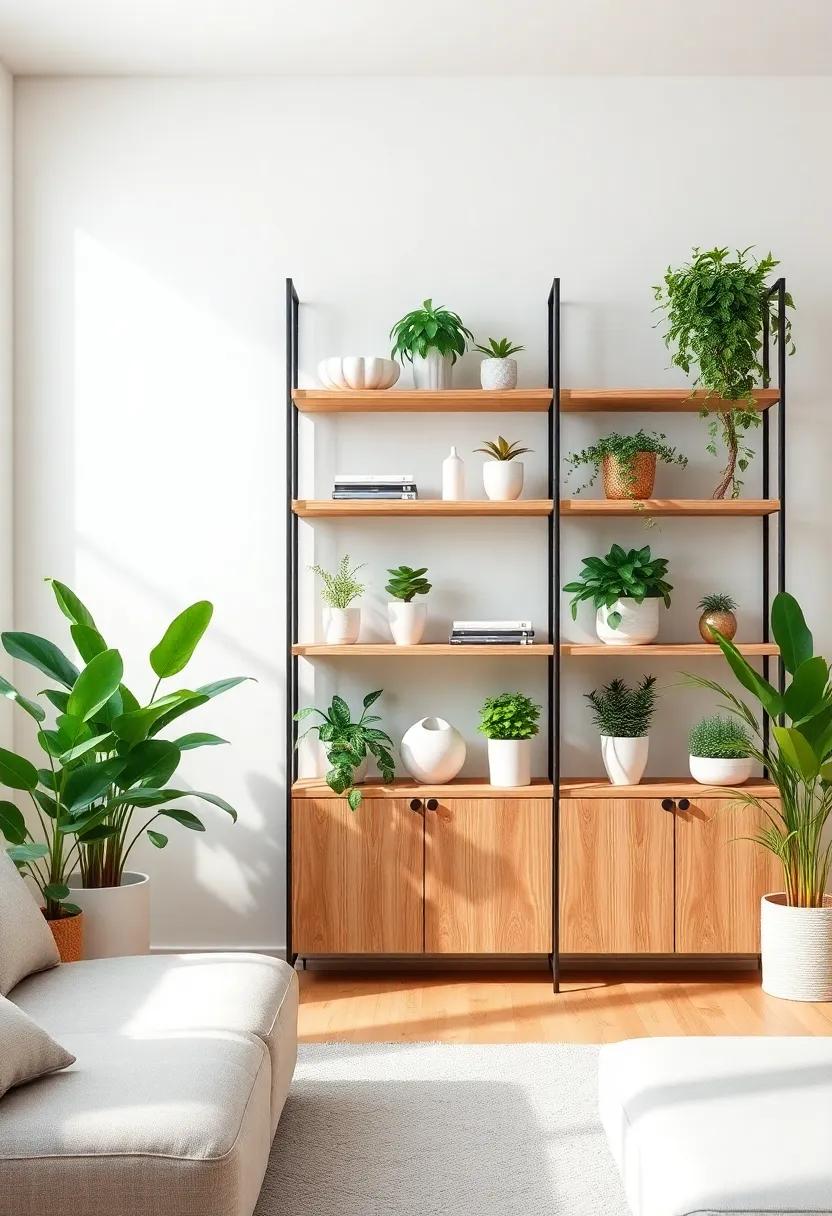
When designing a plant-filled living room,minimalist shelving can be the perfect way to balance functionality and aesthetics. Opt for sleek, floating shelves made from sustainable materials like bamboo or reclaimed wood. These materials not only add a touch of natural warmth but also align with eco-friendly principles. Pair them with geometric planters or terracotta pots to create a harmonious blend of modern and organic elements. The key is to keep the design simple, allowing the greenery to take center stage.
Consider arranging your shelves with intentional spacing to avoid clutter. Here’s a quick guide to styling your minimalist shelves:
- Layer by height: Place taller plants at the back and smaller ones in front for depth.
- Mix textures: Combine smooth-leaved plants like snake plants with textured ones like ferns.
- Add accents: Incorporate small decorative items like ceramic sculptures or woven baskets for contrast.
| Material | Style | Best For |
|---|---|---|
| Bamboo | Lightweight, modern | Small to medium plants |
| Reclaimed Wood | Rustic, earthy | Large statement plants |
| Metal | Industrial, sleek | Succulents and air plants |
Balancing Light and Shadow with Plant-Filled Shelves
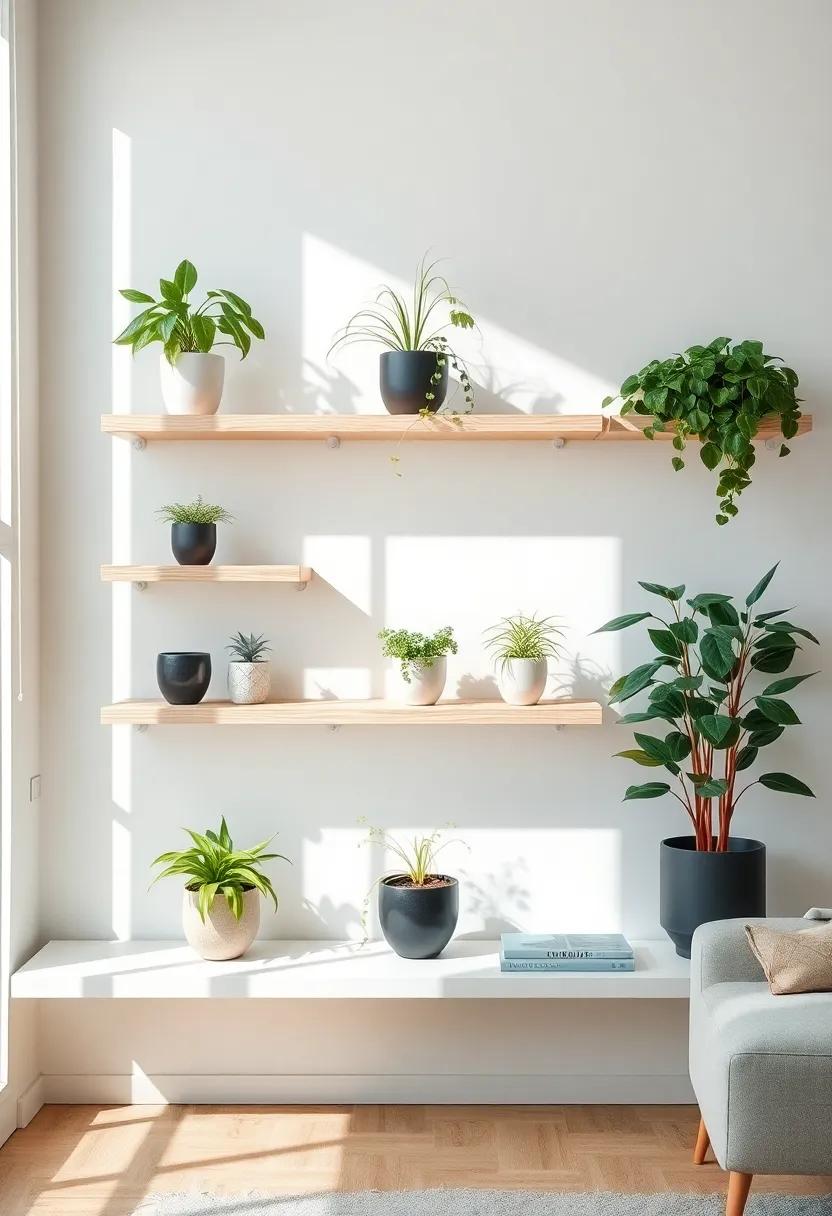
Creating a harmonious balance between light and shadow is essential when designing a plant-filled living room. Shelves adorned with greenery not only add life to your space but also play with natural light to create dynamic visual interest. Position taller plants on lower shelves to cast intriguing shadows, while smaller, trailing varieties on higher shelves allow light to filter through, creating a layered effect. Consider using open-back shelves to let light flow freely, enhancing the interplay between brightness and shade.
To achieve this balance, experiment with the arrangement of your plants and shelves. Here’s a quick guide to help you get started:
- Light-loving plants: Place succulents or cacti near the top where sunlight is abundant.
- Shade-tolerant plants: Ferns or pothos thrive in lower, dimmer areas, adding depth to your design.
- Reflective surfaces: Use metallic or glass planters to bounce light around the room.
| Plant Type | light Preference | Ideal Shelf Position |
|---|---|---|
| Succulents | Shining, direct light | Top shelves |
| Ferns | Low to medium light | Bottom shelves |
| Trailing Pothos | Indirect light | Middle shelves |
Creating Depth and Texture with Layered Plant Arrangements
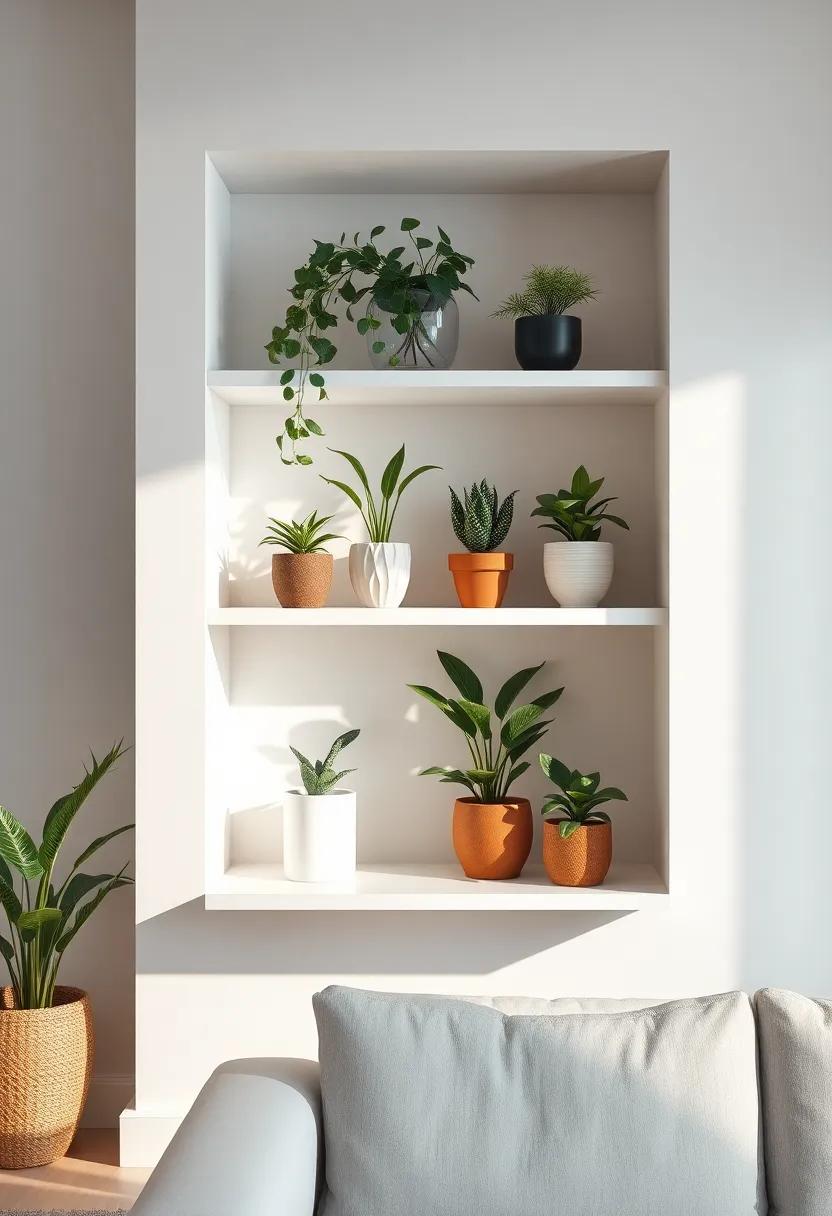
Transform your living room into a lush sanctuary by mastering the art of layered plant arrangements. Start by selecting a variety of plants with differing heights, textures, and foliage colors. Place taller plants like fiddle leaf figs or bird of paradise at the back, while cascading varieties such as pothos or string of pearls spill gracefully over the edges of shelves. This creates a dynamic visual flow that draws the eye upward and outward, making the space feel larger and more inviting.
To enhance the depth and texture of your arrangement, consider these key elements:
- Mix and Match: Combine glossy leaves with matte finishes, or pair spiky succulents with soft, feathery ferns.
- Play with Pots: Use a mix of ceramic, terracotta, and woven baskets to add tactile interest.
- Incorporate Levels: Utilize floating shelves,ladder stands,or tiered planters to create vertical layers.
| Plant Type | Texture | Placement |
|---|---|---|
| Monstera | Large,split leaves | Mid-level shelf |
| Snake Plant | Vertical,rigid leaves | Floor or low shelf |
| Spider Plant | Long,arching foliage | Hanging or high shelf |
The Role of color in Harmonizing Plants and Shelving
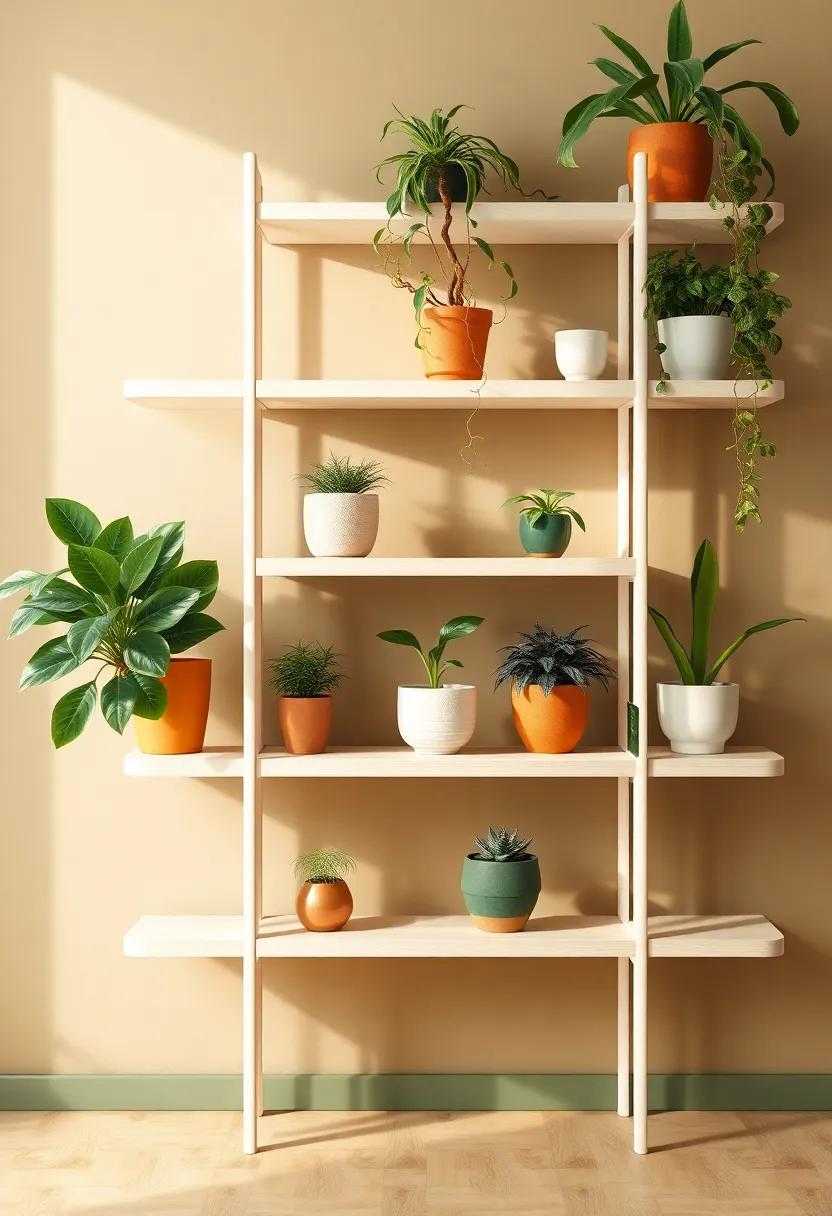
Color plays a pivotal role in creating a cohesive and visually appealing space where plants and shelving coexist harmoniously. By carefully selecting hues that complement both your greenery and the shelving material,you can elevate the overall aesthetic of your living room. Neutral tones like beige, white, or soft grey for shelves allow the vibrant greens of your plants to take center stage, while earthy tones such as terracotta or warm wood finishes can enhance the natural vibe. For a bold statement, consider contrasting colors—deep navy or charcoal shelves paired with bright, variegated foliage can create a striking focal point.
To achieve balance, think about the interplay of colors in your space. Here’s a quick guide to pairing plant and shelf colors effectively:
- monochromatic: Use varying shades of green for both plants and shelves to create a serene, unified look.
- Complementary: Pair warm-toned shelves (like oak or walnut) with cool-toned plants (such as eucalyptus or snake plants) for a dynamic contrast.
- Accent Colors: Introduce colorful pots or decorative elements on neutral shelves to add pops of color without overwhelming the space.
| shelf Color | Plant Type | Effect |
|---|---|---|
| White | Ferns | Clean, airy feel |
| Dark wood | Rubber Plants | Rich, grounded vibe |
| Pastel Pink | Succulents | Playful, modern touch |
Maximizing Small Spaces with Compact Green Shelving Solutions
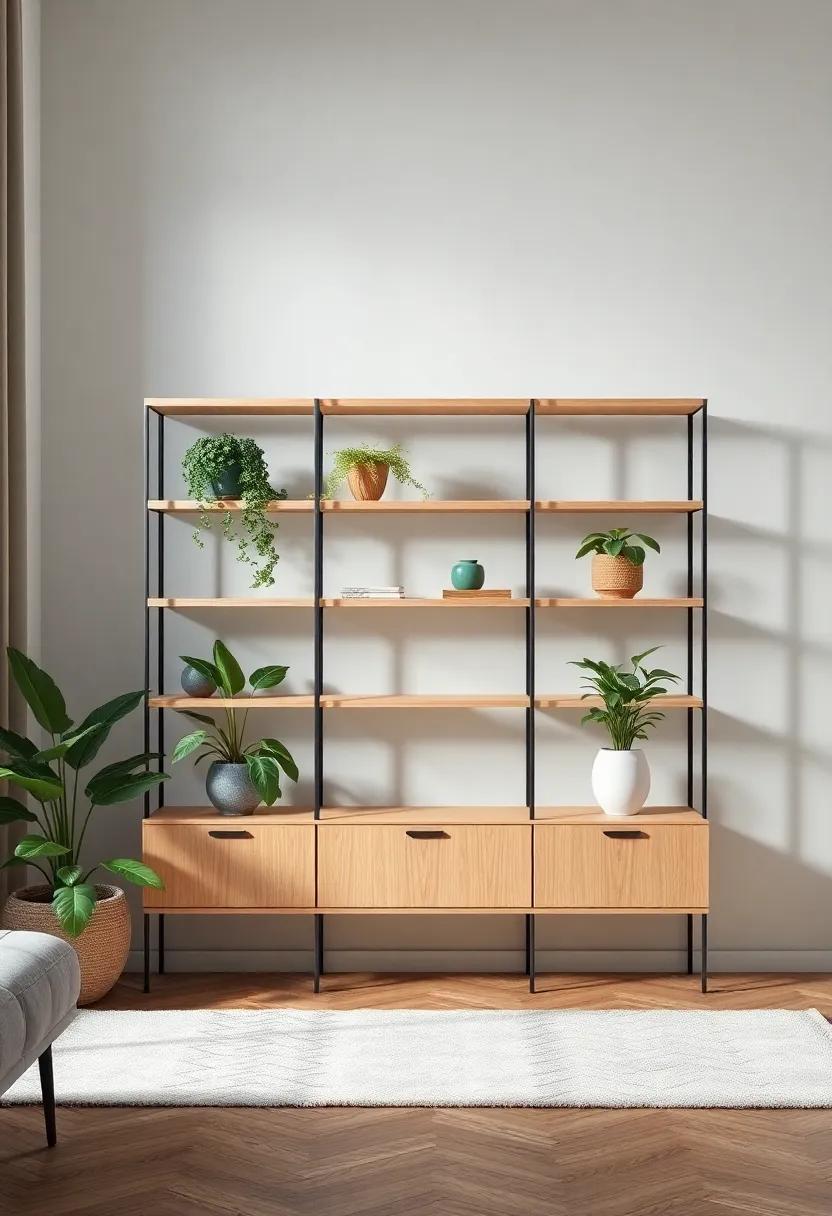
Transforming a small living room into a lush, plant-filled oasis is easier than you think with compact green shelving solutions. These space-saving designs not only add a touch of nature but also enhance the room’s aesthetic appeal. Floating shelves are a perfect choice for tight spaces,allowing you to display trailing plants like pothos or ivy without cluttering the floor. Pair them with geometric wall planters for a modern,minimalist look. For a more rustic vibe, consider ladder shelves—their vertical design maximizes height while offering multiple tiers for your favorite greenery.
When selecting shelving, think beyond functionality and focus on style.Mix and match materials like wood, metal, and glass to create visual interest. For example, a wooden shelf with a natural finish complements leafy plants like monsteras, while a metallic frame adds a sleek contrast to succulents. To keep your space organized,use the following table as a guide for pairing plants with shelving styles:
| Shelving Style | recommended Plants |
|---|---|
| Floating Shelves | Pothos,Ivy,Ferns |
| Ladder Shelves | Snake Plants,Succulents,Air Plants |
| Geometric Wall Planters | String of Pearls,spider Plants,Small Cacti |
- Tip: Use shelves with built-in lighting to highlight your plants and create a cozy ambiance.
- pro tip: Rotate plants seasonally to keep your display fresh and vibrant.
Integrating Organic Shapes into Your Shelving Design
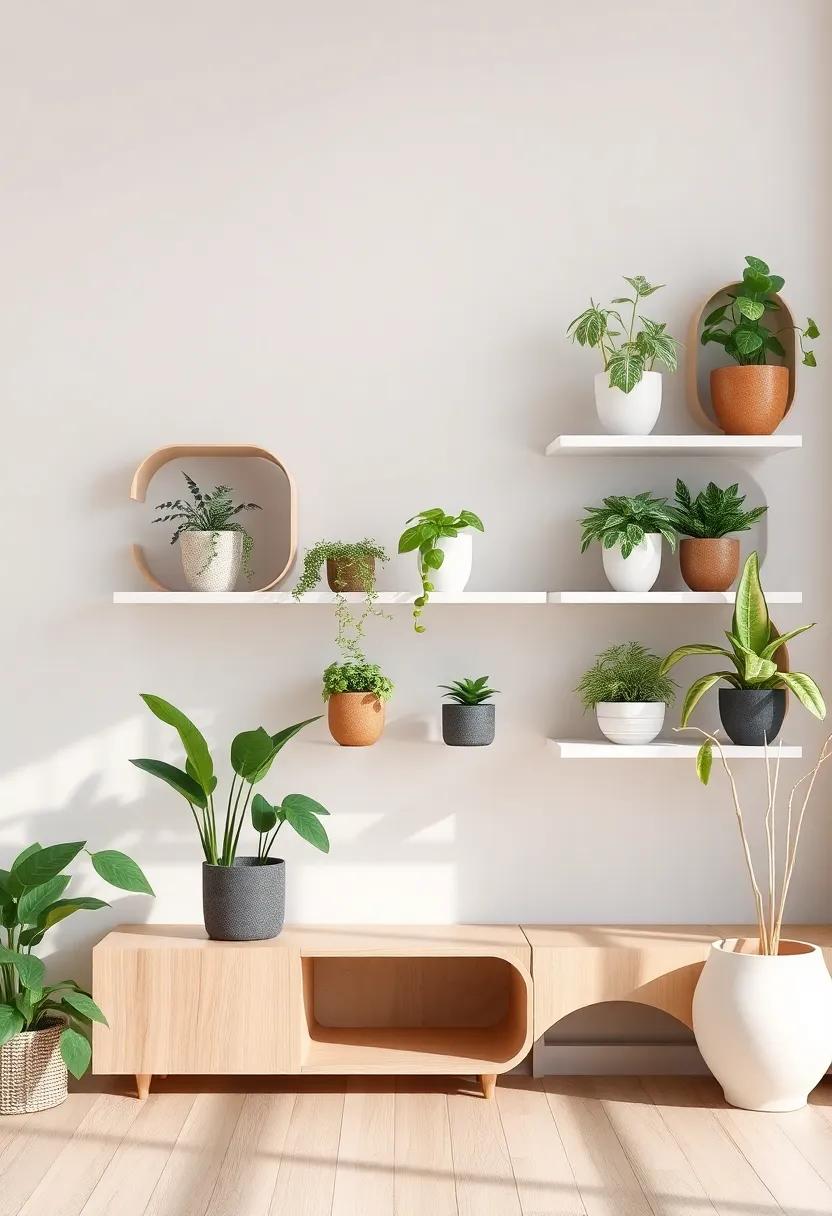
Incorporating organic shapes into your shelving design can transform your living room into a harmonious blend of nature and modern aesthetics. Think beyond straight lines and rigid structures—opt for curved shelves, asymmetrical designs, or even tree branch-inspired units. These elements not only complement the lush greenery of your plants but also create a sense of flow and movement in the space. Consider materials like natural wood, rattan, or stone to enhance the organic feel, ensuring your shelves feel like an extension of the natural world.
To achieve a cohesive look, balance is key.Pair your organic shelving with minimalist decor to avoid overwhelming the space. Here are a few ideas to get you started:
- Floating cloud Shelves: Install curved, cloud-like shelves that mimic the softness of nature.
- Branch-Inspired Units: Use shelves shaped like tree branches to create a forest-like vibe.
- Wave Shelving: Incorporate wavy designs that add a dynamic, fluid element to your walls.
| Material | Style | Best For |
|---|---|---|
| Natural Wood | Rustic | Warm, earthy tones |
| Rattan | Bohemian | Light, airy spaces |
| Stone | Minimalist | Modern, sleek interiors |
Pairing Statement Plants with Bold Shelving Structures
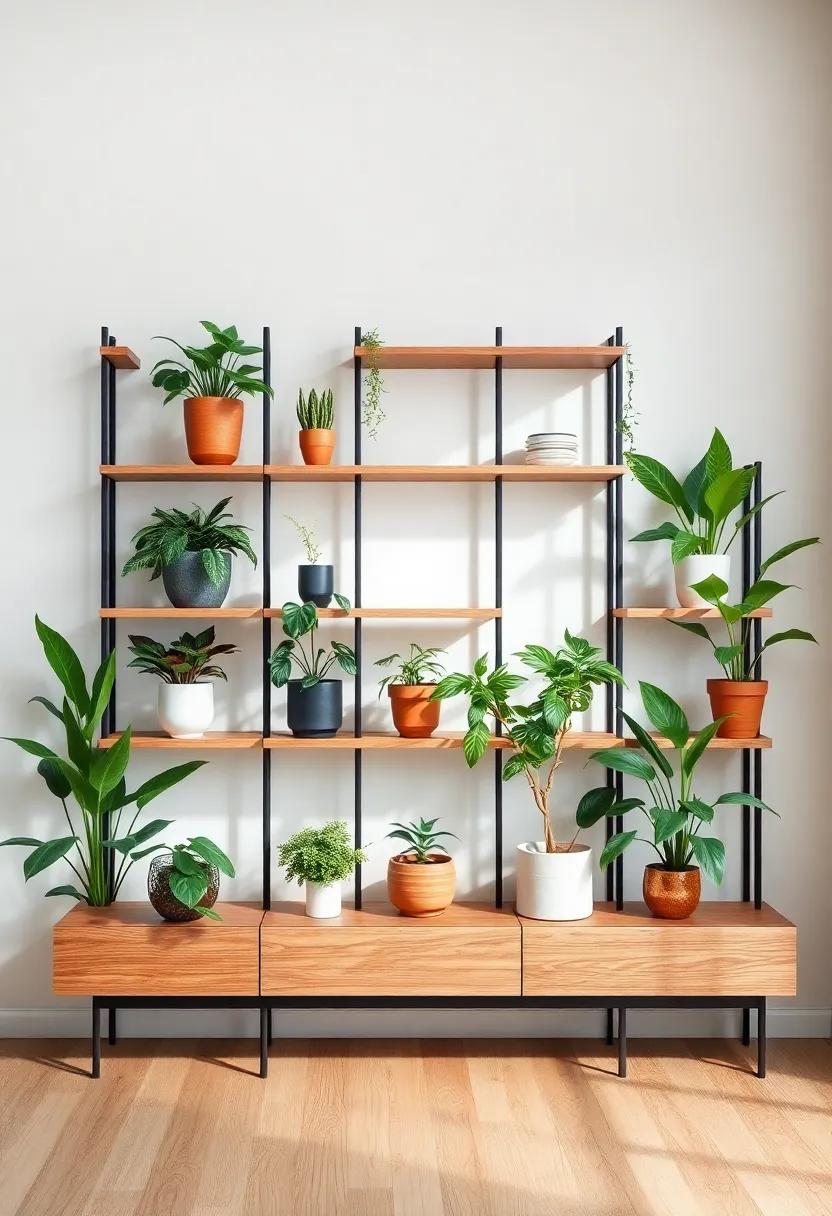
When it comes to creating a harmonious balance between nature and design, can transform your living room into a lush, stylish sanctuary. Opt for architectural plants like the fiddle Leaf Fig or Monstera Deliciosa to add height and drama, while sleek, geometric shelving in matte black or brushed metal provides a striking contrast. This combination not only highlights the greenery but also anchors the space with a modern, polished aesthetic.
To achieve a cohesive look, consider the following tips:
- Layering: Place trailing plants like Pothos or String of Pearls on higher shelves to create a cascading effect.
- Color Coordination: match the tones of your planters with the shelving material for a seamless blend.
- Negative Space: Leave some shelves bare to let the plants and structure breathe, avoiding visual clutter.
| Plant Type | Shelving Material | Style |
|---|---|---|
| Fiddle Leaf Fig | Black Metal | Modern |
| Monstera Deliciosa | Walnut Wood | Mid-Century |
| Pothos | White Lacquer | Scandinavian |
The Elegance of Floating Shelves in a Plant-Centric Room
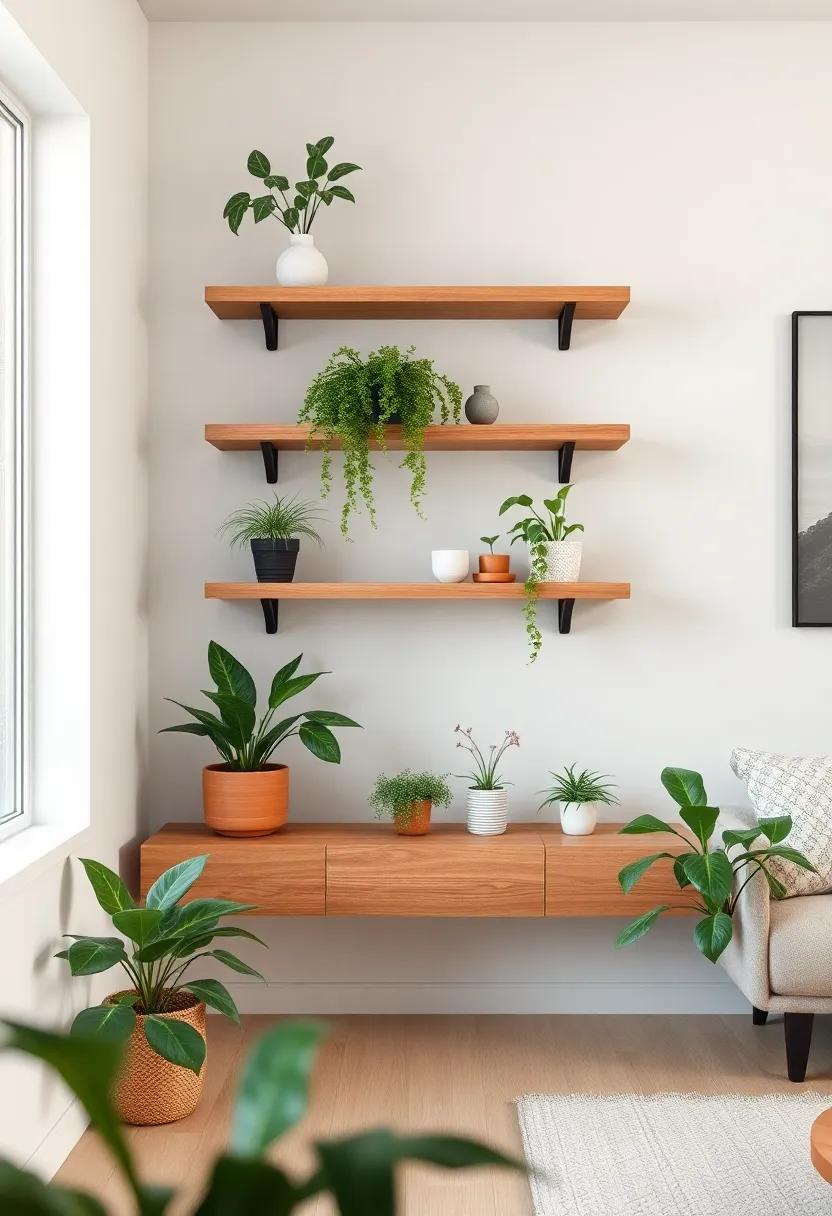
Floating shelves bring a sense of airy sophistication to any plant-filled living room,effortlessly blending functionality with aesthetic appeal. Their minimalist design allows the greenery to take center stage, creating a harmonious balance between nature and modern decor. By arranging plants of varying heights and textures on these shelves, you can craft a dynamic visual display that feels both curated and organic. Pro tip: Use trailing plants like pothos or string of pearls to add a cascading effect, enhancing the sense of movement and depth in the room.
When styling floating shelves,consider the following elements to elevate your plant-centric space:
- Layering: Place larger plants at the back and smaller ones in front to create depth.
- Containers: Opt for pots in neutral tones or natural materials like terracotta to complement the greenery.
- Lighting: Add small LED strip lights beneath the shelves to highlight your plants during the evening.
| Plant Type | Recommended Shelf Placement |
|---|---|
| Succulents | Top shelf for maximum sunlight |
| ferns | Middle shelf for indirect light |
| Trailing Plants | Bottom shelf for a cascading effect |
Using Natural Wood Tones to Complement Indoor Greenery
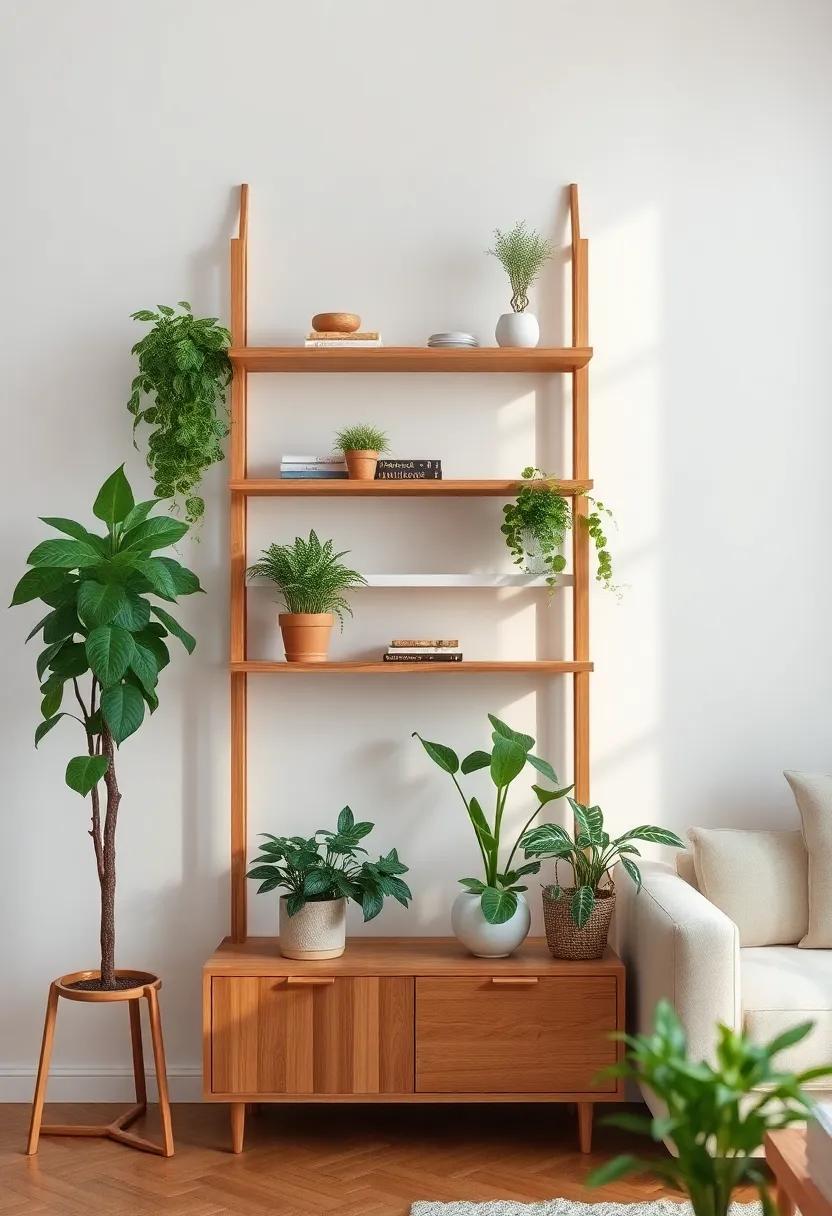
Incorporating natural wood tones into your plant-filled living room creates a harmonious balance between organic textures and vibrant greenery. The warmth of wood complements the lushness of plants, making the space feel inviting and grounded. Consider using light oak or walnut finishes for shelving units,as these tones enhance the natural beauty of your indoor garden without overpowering it. Pairing wooden shelves with trailing plants like pothos or ivy adds a dynamic visual flow, while potted succulents or ferns on darker wood surfaces create a striking contrast.
To elevate the design, mix and match different wood types and finishes for a layered, eclectic look. For example:
- Floating shelves in light birch for a minimalist vibe.
- Reclaimed wood ladder shelves for a rustic touch.
- Mid-century modern teak stands for a sleek, timeless appeal.
| wood Type | Best Paired With |
|---|---|
| Oak | Monstera, Fiddle Leaf Fig |
| walnut | Snake Plant, ZZ Plant |
| Pine | Spider Plant, String of Pearls |
by thoughtfully combining natural wood tones with your greenery, you can create a living room that feels both elegant and alive, blending style with the serenity of nature.
Designing Shelving That Grows with Your Plant Collection
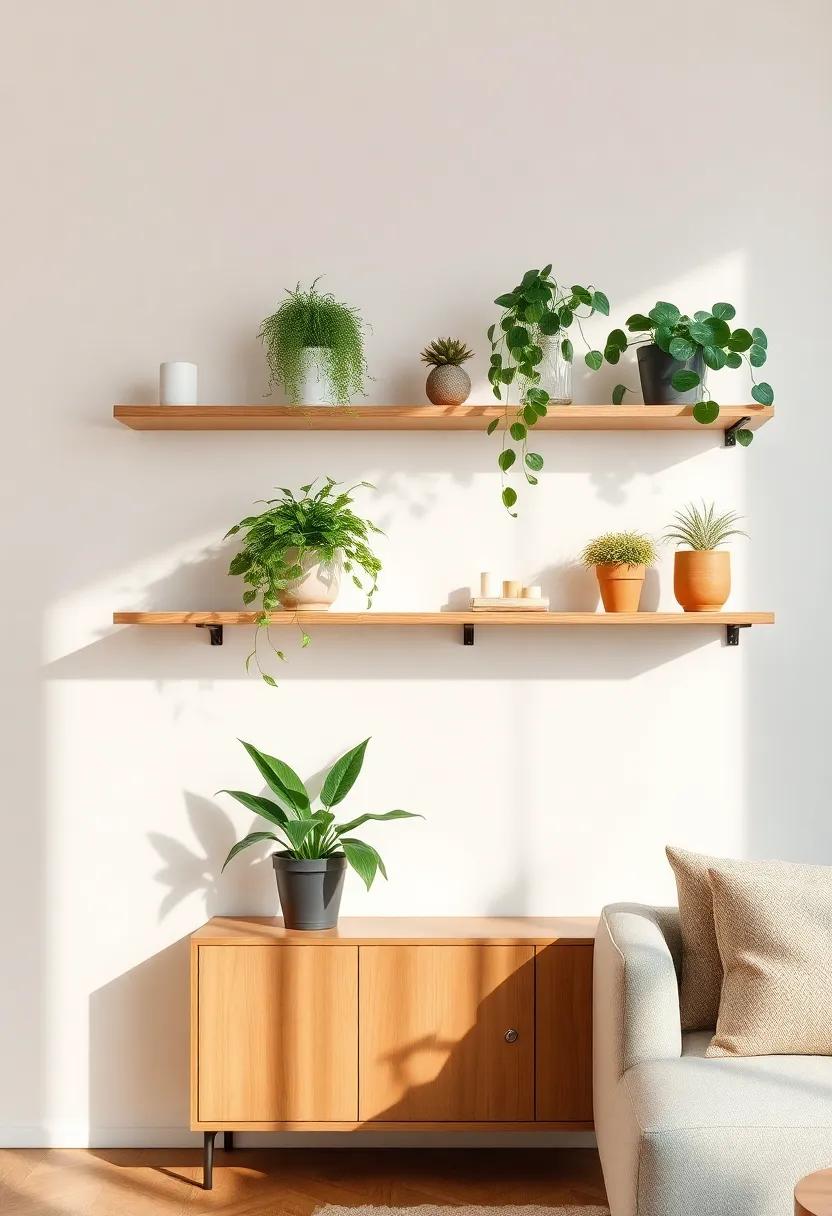
Creating shelving that adapts to your ever-growing plant collection is both a practical and artistic endeavor. Start by choosing modular designs that allow you to add or rearrange shelves as your greenery expands. floating shelves are a fantastic option, offering a sleek, modern look while maximizing vertical space. For a more rustic vibe, consider ladder shelves or tiered plant stands that can be easily adjusted. Incorporate materials like reclaimed wood,metal,or bamboo to complement your decor while ensuring durability. don’t forget to leave room for trailing plants—shelves with open edges or staggered levels are perfect for showcasing their cascading beauty.
When designing your shelving, think about the needs of your plants and your living space. Here’s a quick guide to help you balance style and functionality:
- Light Exposure: Position shelves near windows or under grow lights for sun-loving plants.
- Airflow: Opt for open designs to ensure proper ventilation for your plants.
- Weight Capacity: Choose sturdy materials to support heavier pots and planters.
- Aesthetic Harmony: Match shelf finishes to your room’s color palette for a cohesive look.
| Shelf Type | Best For |
|---|---|
| Floating Shelves | Small to medium plants, minimalist decor |
| Ladder Shelves | Trailing plants, bohemian or rustic themes |
| Tiered Stands | Grouping plants of varying heights, compact spaces |
The Impact of Symmetry in Green Shelving Arrangements
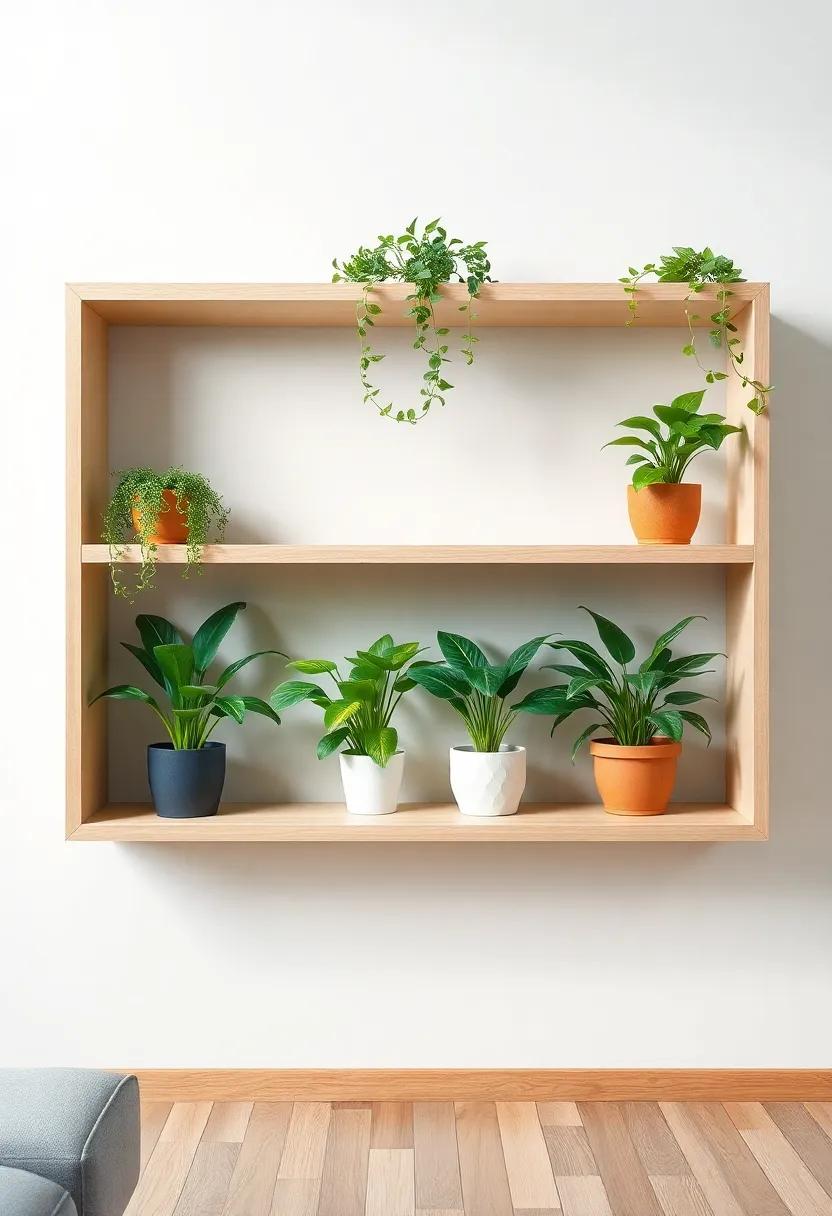
Symmetry plays a pivotal role in creating visually appealing green shelving arrangements, transforming your living room into a harmonious sanctuary. By balancing plants of varying heights,textures,and shades of green,you can achieve a sense of order that feels both intentional and effortless. As an example, placing taller plants like fiddle-leaf figs or snake plants on either end of a shelf, with smaller succulents or trailing pothos in the center, creates a natural focal point. This approach not only enhances the aesthetic but also ensures that each plant receives adequate light and space to thrive.
To further elevate the symmetry, consider incorporating decorative elements that complement your greenery. Here’s a quick guide to balancing your shelves:
- Pairing: Use identical planters or pots for a cohesive look.
- Layering: Arrange plants in tiers, with taller ones at the back and shorter ones in front.
- Spacing: Maintain equal distances between items to avoid clutter.
| Element | Placement | Effect |
|---|---|---|
| Tall Plants | Corners | Adds height and structure |
| Trailing Plants | Center | Softens edges and adds flow |
| Decorative Items | Between Plants | Enhances visual interest |
By thoughtfully arranging your green shelving, you can create a space that feels both elegant and alive, blending nature’s beauty with modern design principles.
Combining Functionality and Beauty in Plant Shelving Units
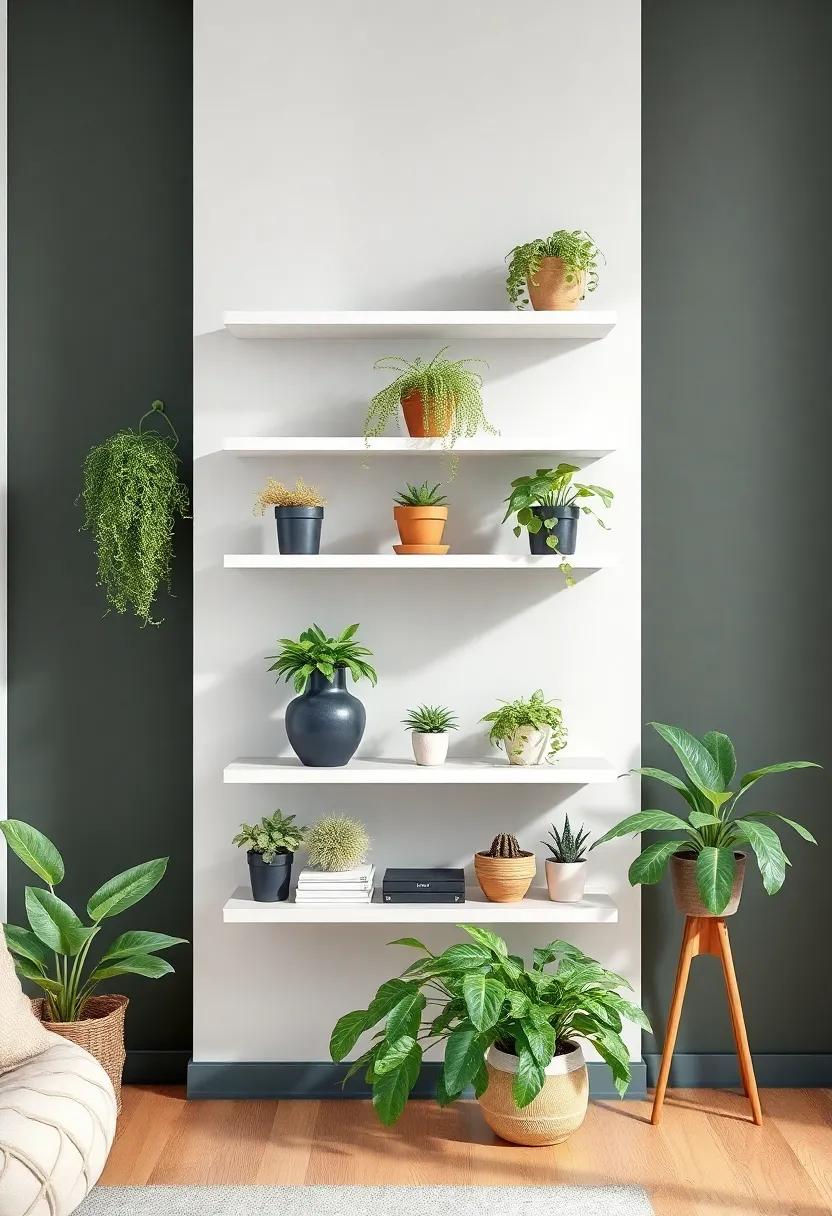
transforming your living room into a lush, green sanctuary doesn’t mean sacrificing style for functionality. Modern plant shelving units are designed to seamlessly blend practicality with aesthetics, offering a perfect balance for plant enthusiasts and interior design lovers alike. Floating shelves are a popular choice, providing a minimalist look while maximizing vertical space. Pair them with geometric planters or hanging terrariums to create a dynamic visual appeal. For a more rustic vibe, consider wooden ladder shelves or repurposed crates, which add warmth and texture to your space. These options not only showcase your plants but also serve as functional storage for books, decor, or small accessories.
When selecting the perfect shelving unit, consider the following elements to ensure it complements your living room:
- Material: Choose from metal, wood, or glass to match your room’s theme.
- Size: Opt for tiered designs to accommodate plants of varying heights.
- Light Exposure: Position shelves near windows to ensure your plants thrive.
| Shelving Type | Best For | Style |
|---|---|---|
| Floating Shelves | Small Spaces | Modern |
| Ladder Shelves | rustic Themes | Farmhouse |
| Glass Shelves | Light-Loving Plants | Contemporary |
By thoughtfully combining functionality and beauty, your plant shelving units can become the centerpiece of your living room, elevating both your decor and your greenery game.
Exploring Unique Planters That Enhance Shelving Aesthetics
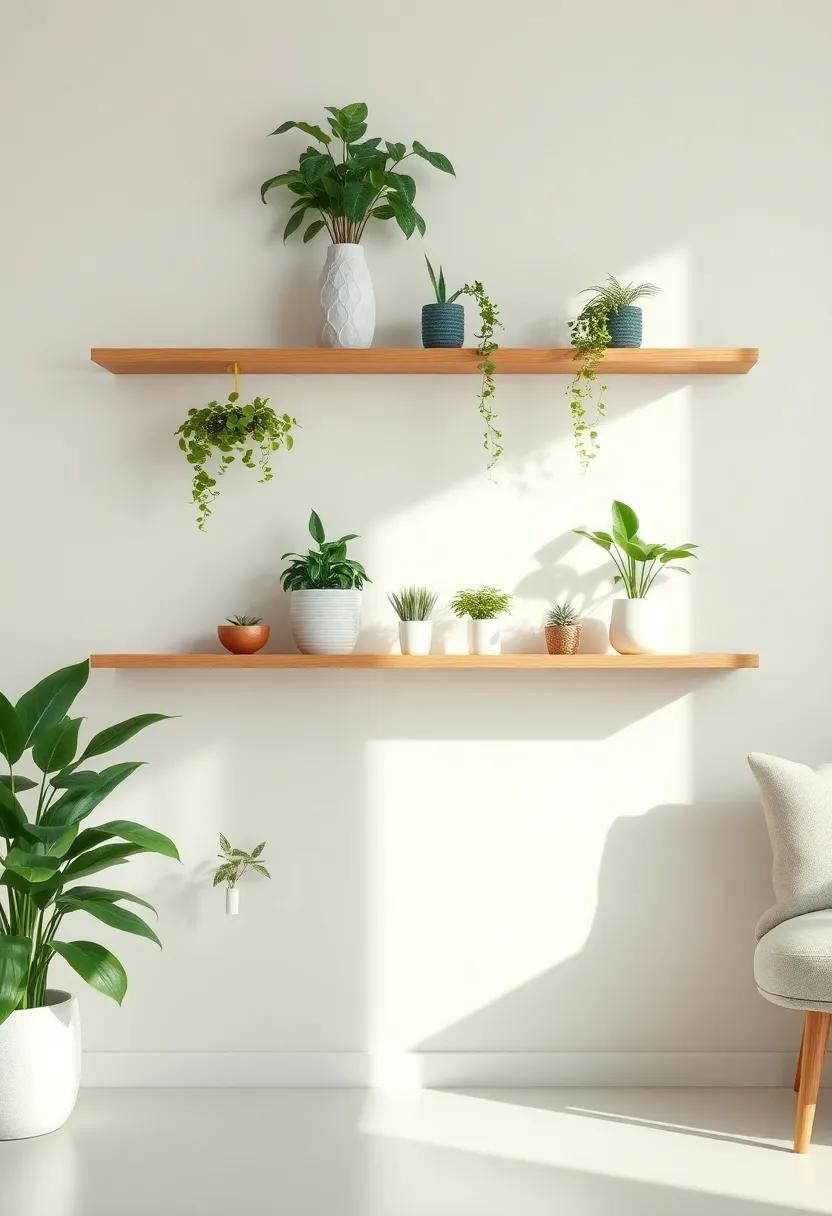
Transform your living room into a lush sanctuary by incorporating unique planters that seamlessly blend with your shelving. From geometric ceramic pots to minimalist hanging planters, the options are endless. Consider terracotta planters for a rustic charm or glass terrariums for a modern touch. Mix and match textures and materials to create a dynamic visual appeal. Such as, pair sleek metal shelves with woven baskets or wooden crates to add depth and character to your space.
Here’s a quick guide to help you choose the perfect planter-shelf combination:
- Vertical Shelving: Opt for cascading plants like pothos or ivy in hanging planters to create a flowing green wall.
- Floating Shelves: Use small, compact planters with succulents or air plants to maintain a clean, uncluttered look.
- Ladder Shelves: Combine tall planters with trailing vines to emphasize the vertical structure.
| Shelf Type | Planter Style | Recommended Plants |
|---|---|---|
| Vertical | Hanging | Pothos, Ivy |
| Floating | Compact | Succulents, Air Plants |
| Ladder | Tall | Trailing Vines, Snake plants |
The Charm of Eclectic Shelving in a Plant-Filled Living Room
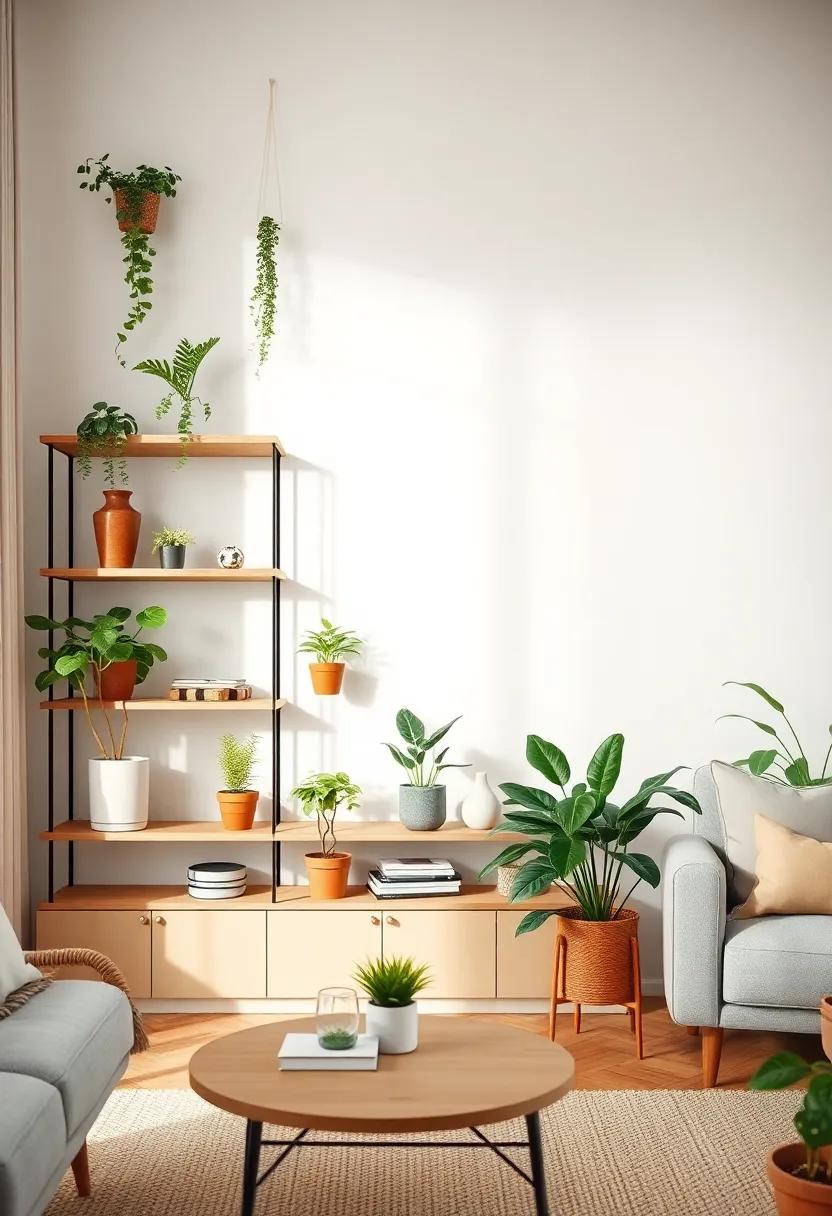
Eclectic shelving brings a unique personality to any plant-filled living room, blending functionality with artistic flair. By mixing materials like reclaimed wood, metal, and glass, you can create a dynamic display that complements your greenery. Consider these ideas to elevate your space:
- Layered Heights: Use staggered shelves to give each plant its own spotlight, ensuring they don’t compete for attention.
- Textured Backdrops: Pair your shelves with textured walls or bold paint colors to make your plants pop.
- Asymmetrical Arrangements: Break free from symmetry by placing shelves at varying angles for a playful,modern look.
To further enhance the charm, incorporate decorative elements like ceramic pots, woven baskets, or vintage trinkets alongside your plants. This not only adds visual interest but also tells a story through your decor. Here’s a quick guide to pairing plants with shelving styles:
| Plant Type | Shelving Style |
|---|---|
| Trailing Plants (e.g., Pothos) | Floating Shelves |
| Succulents | Geometric Shelves |
| Tall Plants (e.g., Fiddle Leaf Fig) | Ladder Shelves |
Creating a Cohesive Look with Matching Shelving and Plant Themes
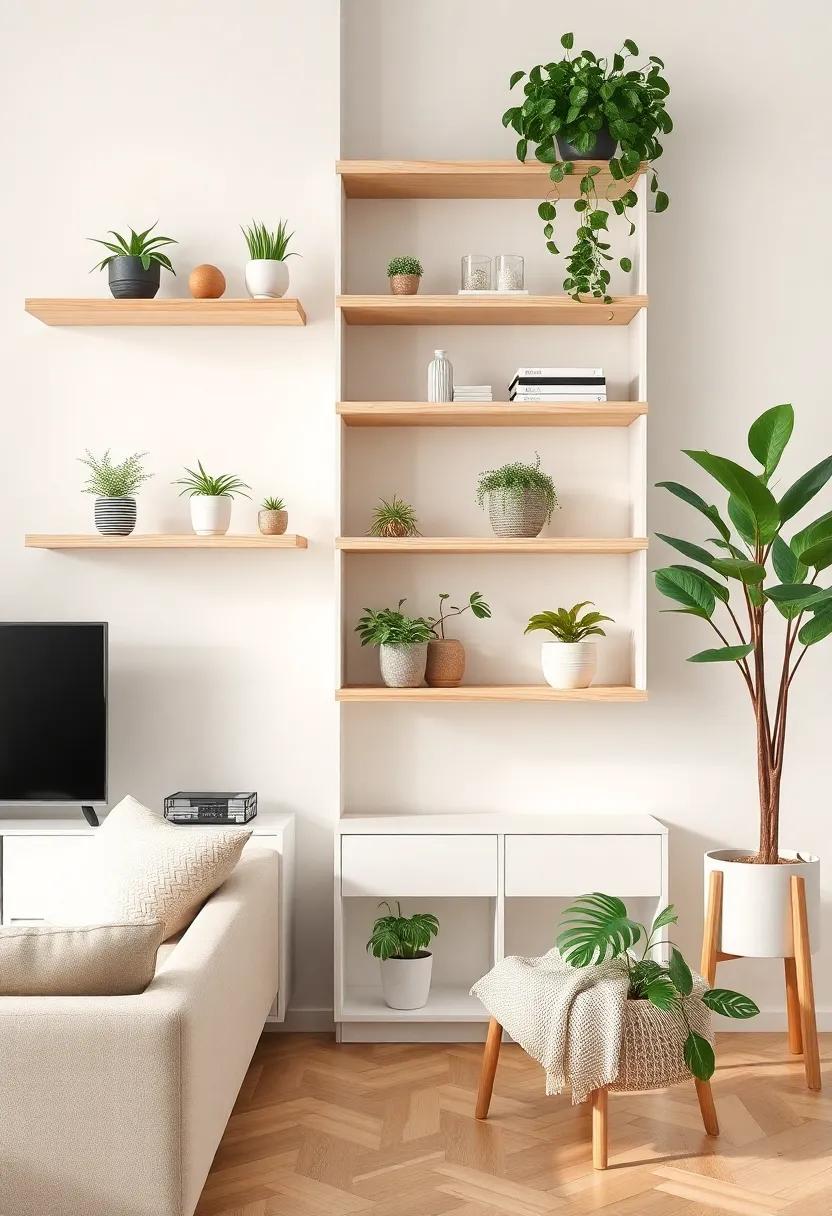
Transform your living room into a lush sanctuary by pairing sleek shelving with thoughtfully curated plant arrangements. Start by selecting shelves that complement your room’s aesthetic—whether it’s minimalist floating shelves, rustic wooden units, or industrial metal racks. The key is to ensure the shelving material and color harmonize with your existing decor. Then, layer your plants in a way that creates visual balance. Mix tall, trailing, and compact plants to add depth and texture, and consider using pots in coordinating tones or materials to tie everything together.
To elevate the cohesive look, incorporate decorative elements that echo your plant theme. For example:
- Natural accents: Add woven baskets, stone planters, or wooden trays to enhance the organic vibe.
- Color coordination: Choose pots and decor in shades that match your shelving or room palette.
- Symmetry and asymmetry: Alternate between symmetrical arrangements for a polished feel and asymmetrical groupings for a more dynamic look.
| Shelving Type | Plant Pairing | Decor Tip |
|---|---|---|
| floating Shelves | Trailing Pothos | Use geometric pots for a modern touch. |
| Wooden Ladder Shelves | Fiddle Leaf Fig | Add macramé hangers for a bohemian vibe. |
| Metal Racks | Succulents | Incorporate metallic planters for a sleek finish. |
The Role of Height Variation in Dynamic Plant Displays
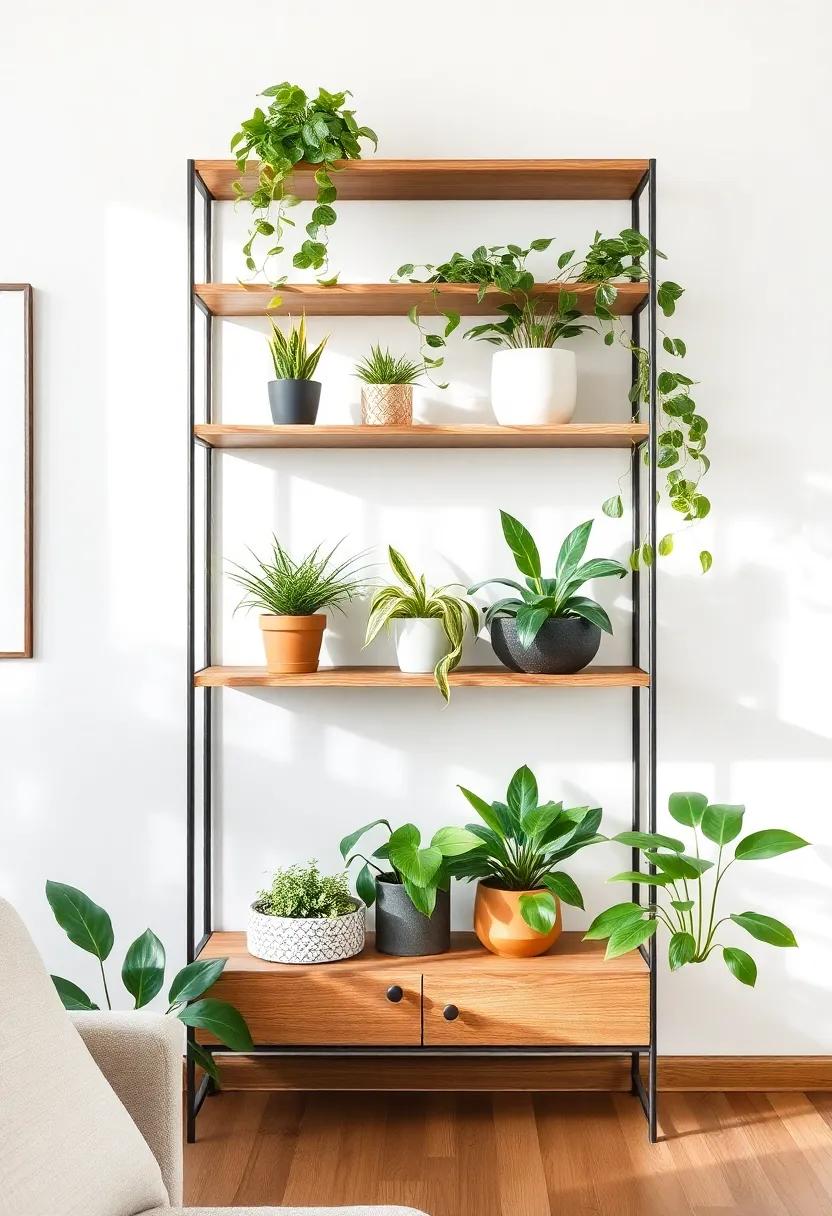
Incorporating height variation into your plant displays is a game-changer for creating visual interest and depth in your living room. By arranging plants at different levels,you can mimic the natural layers of a forest,adding a dynamic and organic feel to your space.Tall plants like fiddle leaf figs or bird of paradise can serve as focal points, while mid-height plants such as snake plants or pothos can fill in the gaps. For a finishing touch, low-profile plants like succulents or trailing ivy can cascade from shelves or sit on side tables, creating a lush, layered effect.
To achieve this, consider using a mix of shelving styles and plant stands. Here’s a quick guide to help you balance your display:
- floating shelves: Perfect for small to medium plants,allowing you to stagger heights effortlessly.
- Ladder shelves: Ideal for showcasing a variety of plants at different levels in a compact footprint.
- Plant stands: Use single or multi-tiered stands to elevate plants and create depth.
| Plant Type | Recommended Placement |
|---|---|
| Tall Plants | Corners or behind furniture |
| Mid-Height Plants | Shelves or side tables |
| Low-Profile Plants | Hanging planters or coffee tables |
Incorporating Metallic Accents for a modern Green Shelving Style
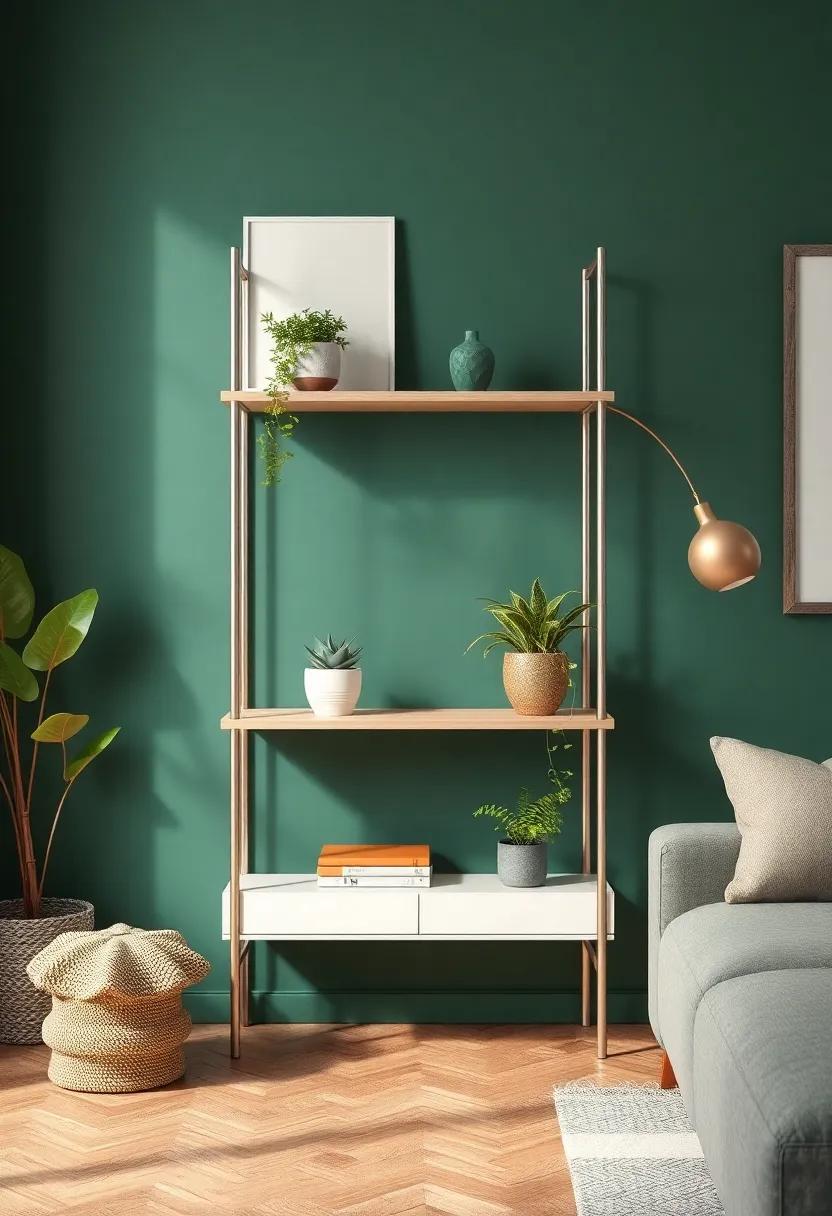
When designing a modern green shelving style,metallic accents can elevate the look,adding a touch of sophistication and contrast. Consider incorporating materials like brushed brass, matte black steel, or polished chrome to complement the lush greenery. These finishes not only enhance the visual appeal but also create a harmonious balance between organic and industrial elements. Such as, pairing a dark green shelving unit with brass brackets or metallic planters can instantly transform your space into a chic, plant-filled haven.
Here are a few ways to seamlessly blend metallic accents into your shelving design:
- Use metallic frames for floating shelves to create a sleek, modern look.
- Add copper or gold-toned planters to contrast with the green foliage.
- Incorporate metal bookends or decorative objects to break up the greenery.
- Opt for metallic hardware on cabinets or drawers for a cohesive design.
| Material | Best Use |
|---|---|
| Brushed Brass | shelving brackets, planters |
| Matte Black Steel | Frames, decorative accents |
| Polished Chrome | Hardware, lighting fixtures |
The Subtle Beauty of Monochromatic Plant and Shelving Themes
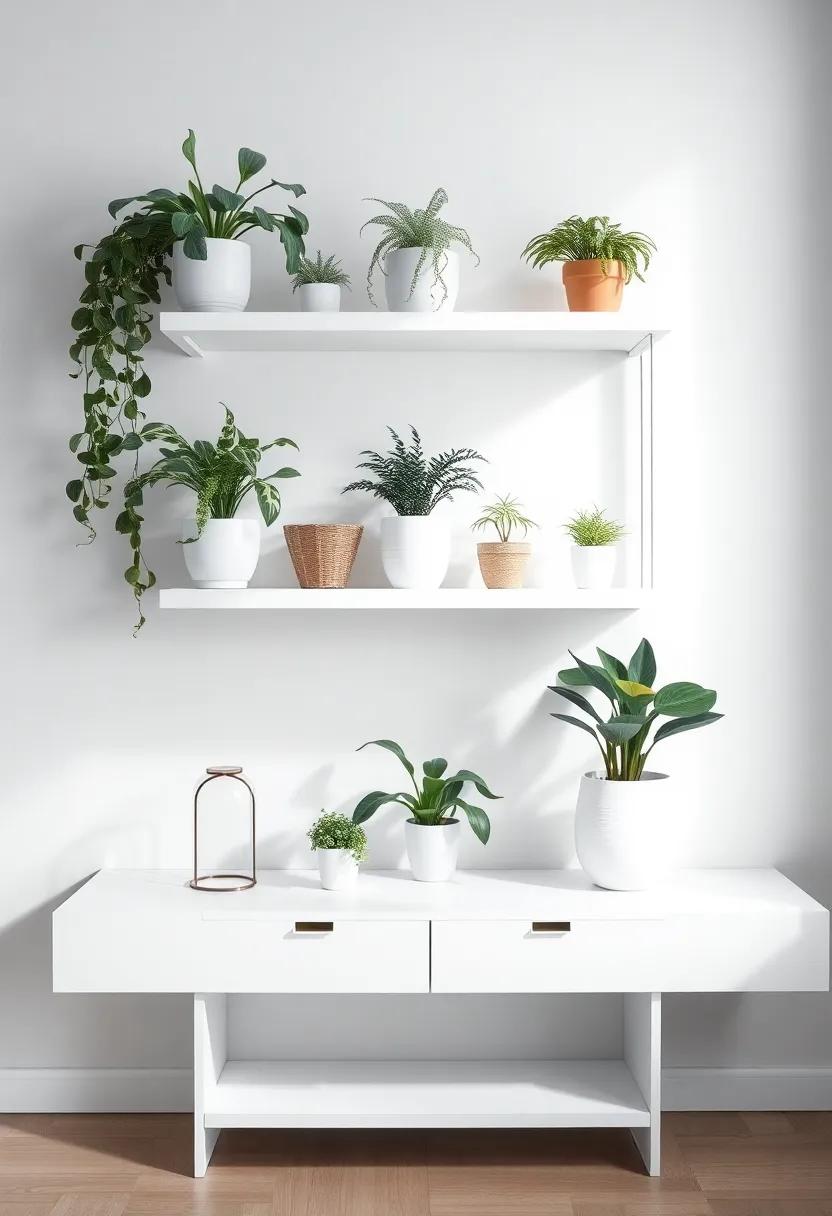
Monochromatic themes bring a sense of calm and sophistication to any space, and when paired with lush greenery, they create a harmonious balance between nature and design. Imagine sleek, minimalist shelving in muted tones of green, adorned with cascading pothos, sculptural snake plants, and delicate ferns. The subtle variations in shade and texture allow each plant to stand out while maintaining a cohesive aesthetic.This approach not only elevates the visual appeal of your living room but also fosters a serene atmosphere,perfect for unwinding after a long day.
To achieve this look, consider the following elements:
- Shelving Material: Opt for matte finishes or natural wood tones in soft greens or earthy hues.
- Plant Selection: Choose plants with varying leaf shapes and sizes to add depth without disrupting the monochromatic palette.
- Decorative Accents: Incorporate ceramic pots, woven baskets, or glass terrariums in complementary shades to enhance the theme.
| Element | Recommendation |
|---|---|
| Shelving Style | Floating shelves or ladder-style units |
| Lighting | Soft, diffused lighting to highlight greenery |
| Color Palette | Sage, olive, and moss tones |
Designing Shelving That Celebrates the Natural Growth of plants
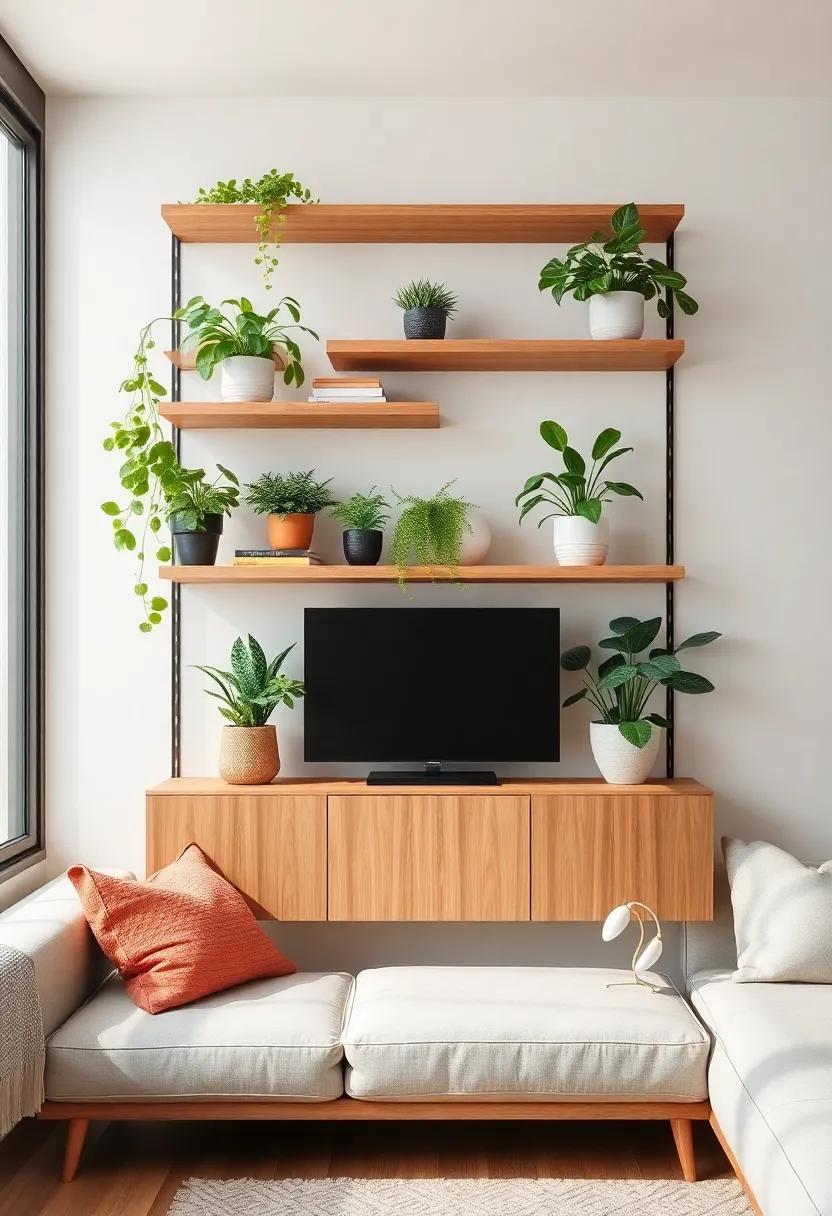
Transform your living room into a lush sanctuary by incorporating shelving designs that harmonize with the natural growth patterns of your plants.Opt for floating shelves that allow trailing vines to cascade gracefully, or choose ladder-style units that provide varying heights for plants to thrive at their own pace. Consider materials like reclaimed wood or metal with a matte finish to complement the organic textures of foliage. These designs not only showcase your greenery but also create a dynamic visual flow that evolves as your plants grow.
To maximize both aesthetics and functionality,think about the following elements when designing your plant shelving:
- Light Exposure: Position shelves near windows to ensure your plants receive adequate sunlight.
- Airflow: Avoid overcrowding shelves to promote healthy air circulation around each plant.
- Versatility: Use modular shelving systems that can be rearranged as your plant collection expands.
| Material | Style | Best For |
|---|---|---|
| Reclaimed Wood | rustic | Trailing Plants |
| Metal | Modern | Succulents |
| Bamboo | Minimalist | Air Plants |
The Interplay of Light and Greenery on Open Shelving Structures
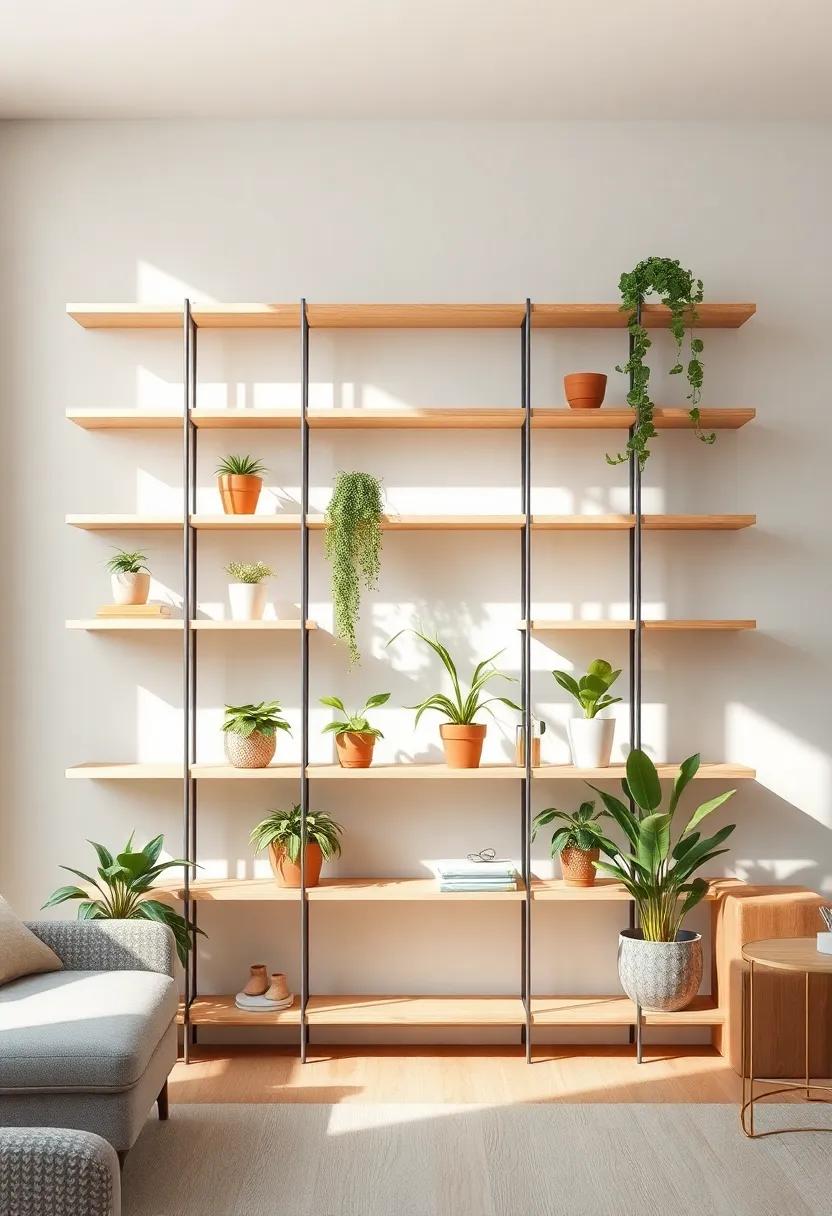
Open shelving structures offer a unique canvas for blending natural light and lush greenery, creating a harmonious balance in your living space. The interplay of sunlight filtering through leaves and reflecting off shelves adds depth and texture to the room. Strategic placement of plants at varying heights ensures that every corner feels alive and dynamic. Consider using trailing plants like pothos or ivy to cascade gracefully,while upright species like snake plants or fiddle leaf figs add vertical interest. This combination not only enhances visual appeal but also promotes a serene,nature-inspired atmosphere.
To maximize the effect, pair your greenery with materials that complement the natural theme. Wooden shelves with a light finish can amplify the warmth of sunlight, while metal frames provide a sleek contrast. Here’s a quick guide to pairing plants with shelving materials:
| Shelving Material | Recommended Plants |
|---|---|
| light Wood | Monstera, ferns, Succulents |
| dark Wood | Rubber Plant, ZZ Plant, Calathea |
| Metal | Snake Plant, Air Plants, cacti |
Experiment with layering by mixing small potted plants with decorative elements like ceramic vases or woven baskets. This approach not only adds texture but also creates a curated, lived-in look. remember, the key is to let the light dance through the foliage, casting playful shadows and transforming your shelves into a living art installation.
To Wrap It Up
As you step back and admire your newly transformed living room, it’s clear that green elegance isn’t just a trend—it’s a lifestyle. With thoughtfully chosen shelving and a lush array of plants, your space has become a harmonious blend of style and nature. Whether you’ve opted for minimalist floating shelves or bold, sculptural designs, the result is a living room that breathes life, creativity, and calm. So, let your shelves tell your story, one leaf at a time, and watch as your home grows into a sanctuary of green sophistication. After all, the best designs are those that grow with you.
 decorifusta Garden and patio decoration inspiration
decorifusta Garden and patio decoration inspiration 